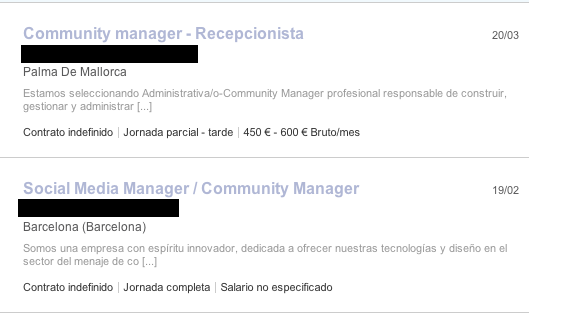Written by María Santoja
Índice
Last February, the Inesdi Digital Professions Survey 2014 was published. In this study, different job offers are reviewed, and based on them, a series of digital professional profiles are defined. Following this publication, we wanted to reflect on employment in the digital sector.
Naming digital professions
It is not surprising that categorizing digital jobs is costly, as the sector is constantly changing and new specializations appear from time to time to cover needs that, until recently, did not even exist. In most cases, the tasks performed by the digital professional are not strictly delimited. We often find that the same employee assumes different professional roles in the same company.
Both the nomenclature and the functions performed by these digital professionals are often ambiguous and it is not clear where the responsibilities of one end and those of the other begin.
The study points out that even the job-seeking companies themselves suffer from this lack of knowledge. In many of the offers published in this study, training corresponding to different digital areas was requested. In fact, in the offers, more attention is usually paid to the skills and knowledge of the professional and the functions that he/she will perform in the company, rather than to the name of the profession itself.
Digital professions
The Inesdi study has grouped 25 professions into 7 digital areas:
- Digital strategy
- Digital marketing
- Social media
- Digital design and development
- Mobile marketing
- Digital analytics
- E-commerce
As we can see, without even going into the professions, the very separation of the sectors is complex, since on many occasions the job demands ask for personnel who are decisive in more than one of these fields. As we said, most job offers are focused on functions and skills, which is why mixed digital professions are appearing. Let’s look at some classic examples:
- SEO and SEM specialist, who can implement a combined organic and paid search results optimization campaign.
- SEO specialist (Digital Marketing sector), who at the same time collects and draws conclusions from the data extracted from online measurement sources, i.e., who performs Digital Analyst functions (Digital Analytics sector).
- Social Media Manager (Social Media sector) who at the same time carries out the content strategy, i.e. who simultaneously works as Content Manager (Digital Marketing sector).
The sectors with the most job offers according to the study are firstly the Social Media branch, followed by Digital Marketing.
New digital professions in 2013
The study also points out new digital professions that did not appear in the previous year’s analysis.
- Community Manager: responsible for the management of communities and social networks.
- Digital Manager: responsible for digital strategy.
- Social Media Manager: responsible for social media strategy.
- Web Developer & Designer Manager: web developer and design manager.
- Digital Communication Specialist: expert in digital communication.
This exemplifies the great dynamism of the digital sector, and the imperative need for constant renewal and training of professionals.
Digital competencies
Although each job requires specific knowledge, there are some skills that are indispensable for those who want to dedicate themselves professionally to the digital environment:
- Good level of English.
- Communication skills, and of course perfect Spanish.
- Ability to work as part of a team.
- To be willing to be continuously trained and therefore, to be a restless, curious and eager to learn person.
Conclusions
With all this we can draw several conclusions that can be useful both for working professionals and for those who want to embark on this world:
First of all, specialization is a necessity and continuous training should be almost a religion. In a sector where changes happen from yesterday to today, whoever falls asleep dies, without further consideration.
Secondly, we find that perhaps in large companies and large cities, employees or freelancers have very limited functions, but in most cases, the digital professional is a bit of a one-man band.
The big challenge facing digital professionals is finding the balance between specialization and meeting the needs of employers who want a “jack-of-all-trades”.

